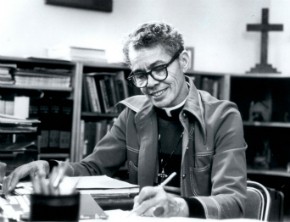Pauli Murray, first black woman Episcopal priest, honored by Yale

A new residential college under construction at Yale University will be named for Anna Pauline Murray, a co-founder of the National Organization for Women who was the first African-American woman to be ordained an Episcopal priest. She is honored as a saint in the Episcopal Church every July 1.
Murray, known as “Pauli,” also held several law degrees, and one of her publications shaped the legal argument for the Brown v. Board of Education Supreme Court case. She earned a doctor of juridical science degree from Yale in 1965 with a dissertation titled “Roots of the Racial Crisis: Prologue to Policy,” according to Yale’s alumni magazine.
“Pauli Murray represents the best of Yale: a preeminent intellectual inspired to lead and prepared to serve her community and her country,” Yale president Peter Salovey wrote in an e-mail this spring announcing the decision.
Yale’s residential college system, modeled after that of England’s great universities, has never before included a college named for a woman or a person of color.
Murray began studies at General Theological Seminary in 1973 and earned a master of divinity degree in 1976, the same year that the Episcopal Church’s General Convention affirmed the ordination of women.
She was ordained a priest in 1977 at the age of 66. She celebrated the Eucharist for the first time at the same parish in Chapel Hill, North Carolina, where her grandmother, a slave, had been baptized.
In 1956 she published a biography of her grandparents, Proud Shoes: The Story of an American Family. An autobiography, originally titled Song in a Weary Throat, came out in 1987, two years after she died.
Students, who had called for a person of color to be honored in the name of a residential college, widely acclaimed the choice of Murray. She is also “lauded as a role model for lesbian and transgender people,” Yale’s alumni magazine wrote, noting that she had sought male hormone therapy in the late 1930s and is buried under the same headstone as a woman with whom she had an intimate relationship for 17 years.
Murray had a long history of fighting against segregation and “Jane Crow,” a phrase she coined and used in her 1964 publication Jane Crow and the Law: Sex Discrimination and Title VII.
She was arrested in 1940 for refusing to sit on a broken seat in the back of a Virginia bus, 15 years before Rosa Parks’s action. She worked on many faith-based, activist, and legal efforts as well as being the only female attorney at an elite New York law firm in the 1950s. Yale’s alumni magazine quoted Emilie Townes, dean of Vanderbilt Divinity School, describing Murray as being “everywhere that things were happening.” —Religion News Service; added sources




